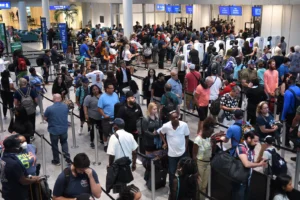Ghanaians living in the United States—whether students, workers, or visitors—are being urged to comply with a new U.S. immigration rule that requires all foreign nationals to register with authorities and carry proof of their legal status at all times.

This follows a new directive under an executive order by former President Donald Trump, which is now being enforced by the U.S. Department of Homeland Security (DHS) and the U.S. Citizenship and Immigration Services (USCIS).
The rule took effect last Friday and applies to all non-U.S. citizens aged 18 and above, including Ghanaians, Nigerians, and other African nationals.
According to the USCIS, everyone considered a “foreign national” (or “alien” under U.S. law) must have proof of their legal status—such as a Green Card, visa documents, or the I-94 entry record—with them at all times.
Who Needs to Register?
All non-citizens aged 18 and above
Visitors, students, workers, Green Card holders
Canadians staying more than 30 days
Parents of children under 14 must register them too
Children under 14 must be registered by their parents or guardians. Once they turn 14, they are required to re-register and undergo biometric processing (fingerprinting) within 30 days.
Even those who have previously registered are being advised to update their information using the new online system. A new form, G-325R, must be completed, and biometric data will be collected unless exempted.
What Happens If You Don’t Comply?
- Failure to follow this rule could lead to:
- Fines
- Criminal charges
- Possible imprisonment
- Unannounced checks by police or immigration officers
Legal Experts Urge Ghanaians to Take Action
Immigration lawyers in the U.S. are warning that this is not a rule to take lightly.“For Ghanaian and Nigerian nationals in particular, this is not a rule to ignore,” said an immigration attorney in New York. “If you’ve been in the U.S. for more than 30 days and don’t have your papers in order, you could face serious consequences.”













